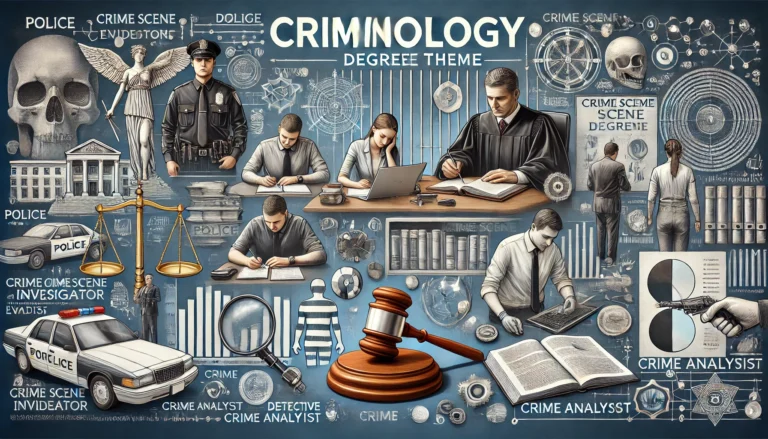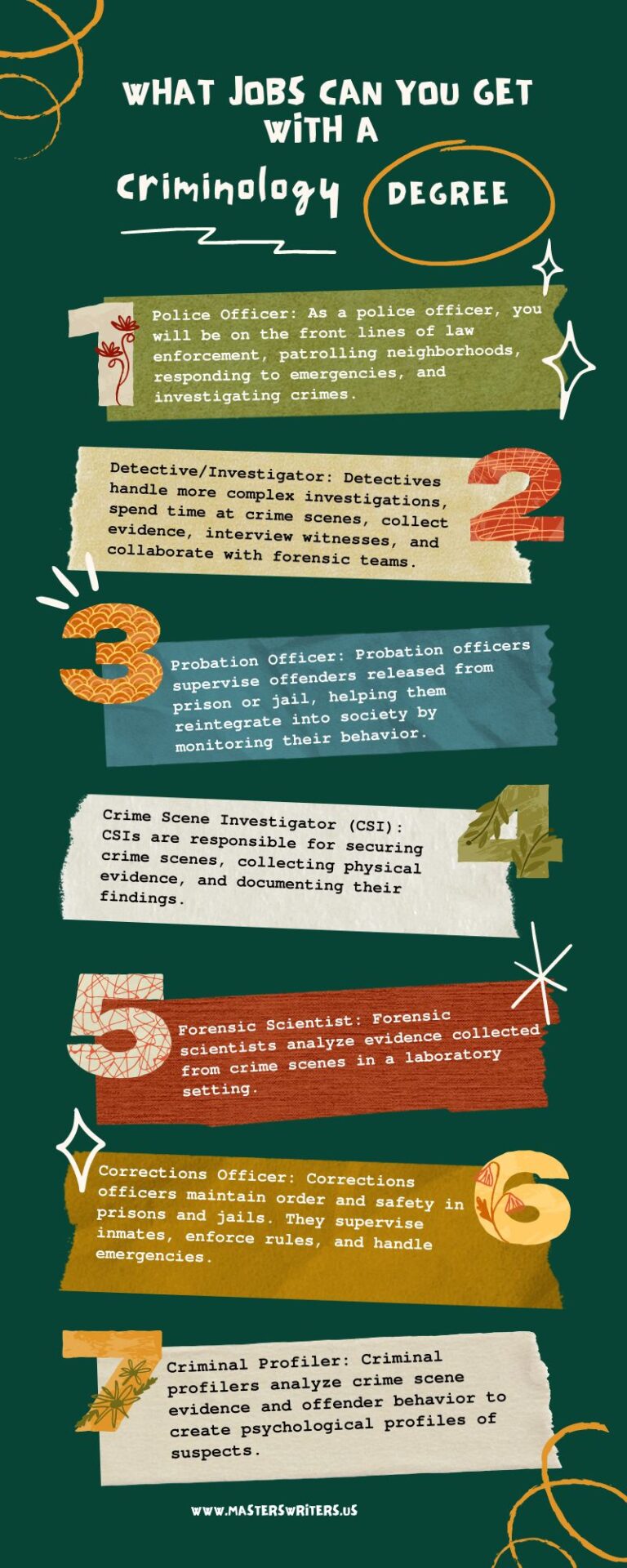Lifestyle
What Can You Do with a Criminology Degree


Are you interested in a career that allows you to combat illegal activities and promote justice actively? If you are passionate about exploring the intricacies of criminal behavior and the legal framework governing society, a criminology degree might be the perfect fit.
This field offers a comprehensive understanding of crime beyond the dramatized depictions seen in media. You’ll delve into the root causes and impacts of criminal actions, as well as the complexities of the justice system. More importantly, you’ll uncover a wide array of career opportunities where you can apply your expertise to make a tangible difference in creating a safer and more just community.
If you need assistance with your coursework, always count on our essay writer online service.
Criminology Degree Overview
A criminology degree delves into the origins and impacts of crime. As a criminology student, you will:
- Analyze crime data to identify patterns and understand the reasons and locations behind criminal activities.
- Utilize your understanding of crime causation to develop effective prevention strategies for communities.
- Explore the roles and interactions of law enforcement, the judicial system, and correctional facilities.
- Benefit from specialized courses that allow you to focus on specific areas, such as cybercrime or juvenile delinquency.
Ultimately, this degree equips you to become a proficient crime analyst. In criminology-related careers, you will leverage data to comprehend criminal behavior and devise prevention strategies, contributing significantly to public safety.
What Do Criminologists Do
A career in criminology equips you with the tools to make a direct impact on crime and justice. Criminologists gather and analyze data about criminal behavior, offering insights into its causes and prevention.
Essential duties of criminologists include:
- Data Analysis: Collect and examine qualitative (descriptive) and quantitative (numerical) crime data. This analysis helps identify trends, understand underlying causes, and develop community-specific strategies to prevent crime.
- Collaboration: Work alongside law enforcement agencies to share insights on crime patterns, aiding in developing proactive policing strategies. Criminologists also collaborate with policymakers, providing data-driven recommendations to inform effective legislation.
Criminologists operate using two primary approaches:
- Reactive Approach: Focuses on analyzing past criminal events to understand the reasons behind them. This analysis helps identify risk factors and prevent similar crimes in the future.
- Preventative Approach: Concentrates on predicting and preventing future crimes. By analyzing crime data and identifying high-risk areas or situations, criminologists help law enforcement allocate resources more effectively to deter crime before it happens.
Why Get a Degree in Criminology
If you seek a dynamic career where you can use data to effect positive change, a degree in criminology is an excellent choice. Here are some compelling reasons to pursue this path:

- High Demand: Crime remains a persistent issue, creating a steady need for qualified criminologists in law enforcement, government agencies, and research organizations.
- Diverse Career Options: Criminology offers more than just police work. Graduates can pursue careers in crime prevention, victim support services, private security, and more.
- Transferable Skills: You’ll acquire valuable skills in data analysis and research, which apply to various fields such as public policy, social work, and beyond.
- Intellectual Stimulation: Criminology is an ever-evolving field that challenges you to think critically about complex social issues and devise innovative solutions.
By choosing criminology, you position yourself to make a meaningful impact on society while enjoying a rewarding and varied career. You can check our comprehensive guide on the best colleges for criminal justice.
Criminology Degree Jobs
A degree in criminology equips you to address and mitigate criminal activities directly. From analyzing data to understanding criminal behavior, your skills are highly valuable across various sectors. Here are some career paths where you can leverage your criminology knowledge and make a substantial impact:

Police Officer: As a police officer, you will be on the front lines of law enforcement, patrolling neighborhoods, responding to emergencies, and investigating crimes. This role involves enforcing laws, conducting traffic stops, and writing reports, among other duties. The U.S. Bureau of Labor Statistics projects a steady demand for police officers, underscoring the ongoing need for qualified professionals. Your criminology background will help you understand criminal behavior patterns and contribute effectively to community policing initiatives.
Detective/Investigator: Detectives handle more complex investigations, spend time at crime scenes, collect evidence, interview witnesses, and collaborate with forensic teams. This role requires analytical skills and a deep understanding of criminal behavior, making your criminology education invaluable. The job outlook for detectives and criminal investigators remains positive, reflecting the need for skilled professionals to solve crimes and ensure public safety.
Probation Officer: Probation officers supervise offenders released from prison or jail, helping them reintegrate into society by monitoring their behavior and enforcing court-ordered conditions. This role is crucial for reducing recidivism rates and supporting rehabilitation efforts. Your criminology degree provides insights into criminal behavior and effective rehabilitation strategies, enabling you to develop plans that help probationers succeed.
Crime Scene Investigator (CSI): CSIs are responsible for securing crime scenes, collecting physical evidence, and documenting their findings. They play a critical role in building solid cases by ensuring that evidence is properly collected and preserved. Your criminology education will help you accurately recognize and collect potential evidence sources, contributing to successful investigations and prosecutions.
Forensic Scientist: Forensic scientists analyze evidence collected from crime scenes in a laboratory setting. They examine fingerprints, DNA samples, and other physical evidence to link suspects to crimes. This role often involves presenting findings in court and requires the ability to explain complex scientific analyses in layman’s terms. Specializations in digital forensics, document analysis, or trace evidence can further enhance your career prospects.
Corrections Officer: Corrections officers maintain order and safety in prisons and jails. They supervise inmates, enforce rules, and handle emergencies. This role also supports inmates’ rehabilitation efforts by offering guidance and maintaining a calm environment. Your criminology background will help you manage conflict effectively and contribute to a safe and orderly correctional facility.
Criminal Profiler: Criminal profilers analyze crime scene evidence and offender behavior to create psychological profiles of suspects. This role involves working closely with detectives and other investigators to provide insights that can solve complex cases. While profiling is not an exact science, it offers valuable perspectives that complement traditional investigative methods.
Victim Advocate: Victim advocates support individuals who have suffered from crimes, helping them navigate the legal system and access necessary resources. They may also work on broader victim rights and safety issues, lobbying for legislative changes and raising public awareness. Your criminology education will enable you to provide informed and compassionate support to victims, helping them rebuild their lives.
Crime Analyst: Crime analysts examine crime patterns, trends, and statistics to help law enforcement develop proactive strategies. This role involves gathering data from various sources, identifying high-crime areas, and providing recommendations for resource deployment and crime prevention. With the increasing availability of crime data, crime analysts play a crucial role in modern law enforcement.
Security Consultant: Security consultants assess vulnerabilities in security systems and develop strategies to protect against potential threats. This role involves conducting thorough checks, recommending improvements, and staying informed about the latest security threats. As cybercrime continues to rise, the demand for security consultants is expected to grow, offering significant opportunities for criminology graduates.
Each career leverages the knowledge and skills gained from a criminology degree, allowing you to make a real difference in promoting justice and public safety.
What Other Jobs Can You Get with a Criminology Degree?
Beyond the roles directly tied to law enforcement and crime analysis, a criminology degree opens doors to various career paths. Here are some additional jobs where your criminology skills and knowledge can be highly valuable:
Social Worker: Your expertise in understanding social issues and criminal behavior makes you well-suited to assist individuals and families facing challenges. Social workers often work with at-risk youth, victims of crime, and those struggling with substance abuse or mental health issues. Your background in criminology will help you address the root causes of these issues and provide adequate support and intervention.
Community Development Worker: Community development workers focus on improving neighborhoods and reducing crime rates by addressing underlying social issues such as poverty, lack of opportunity, and social disorganization. Your criminology education equips you with the skills to design and implement programs that enhance community safety and well-being.
Paralegal: With your knowledge of the legal system, you can thrive in a legal setting as a paralegal. Paralegals assist lawyers with research, case preparation, and legal documentation. Your criminology background will give you a deeper understanding of criminal law and procedure, making you a valuable asset in any legal team.
Intelligence Analyst: Intelligence analysts work for government agencies, gathering and analyzing information to assess potential threats and risks, both domestic and international. Your analytical skills and understanding of criminal behavior are crucial in this role, helping to develop strategies to counteract and prevent criminal activities.
Research Analyst: Criminology research is essential for informing policy decisions and crime prevention strategies. As a research analyst, you will gather data, analyze trends, and prepare reports to contribute to a better understanding of criminal behavior. Your work can influence public policy and lead to more effective crime prevention measures.
Fraud Investigator: Fraud investigators specialize in detecting and investigating fraudulent activities. Your criminology training will help you understand the motives and methods behind fraud, allowing you to analyze financial transactions and other data to identify suspicious patterns and prevent financial crimes.
A criminology degree provides a versatile foundation that can lead to numerous rewarding career paths, each offering the opportunity to make a meaningful impact on society.
What is the Highest Paying Job in Criminology
Judges and hearing officers lead the way at the top of the salary scale, overseeing legal proceedings and making crucial decisions within the justice system. Their median annual salary of $128,710 reflects the significant responsibility and expertise required for this vital role.
Here’s a look at ten of the highest-paying careers in criminology, ranked by median annual salary:
Rank 🏆 | Job Title 💼 | Median Annual Salary 💵 |
1 | Judge and Hearing Officers 👨⚖️ | $128,710 |
2 | Attorney or Lawyer 👩⚖️ | $127,990 |
3 | FBI Specialist 🕵️ | $100,000 |
4 | FBI Agent 🕵️♀️ | $93,970 |
5 | Criminologist 🔍 | $92,910 |
6 | Financial Examiner 💰 | $81,410 |
7 | Intelligence Analyst 📊 | $72,429 |
8 | Forensic Psychologist 🧠 | $72,285 |
9 | Security Manager 🔐 | $71,922 |
10 | Police Officer 🚔 | $66,020 |

Criminology Paper Got You Handcuffed to the Library?
No need! Our experts can help you find sources, organize your ideas, and write clearly and powerfully.
FAQs
What can you do with a criminology degree?
A criminology degree opens up various career paths, including law enforcement, criminal justice, and research roles. Graduates can work as police officers, detectives, probation officers, crime analysts, forensic scientists, and more. Additionally, the degree provides a foundation for roles in social work, community development, and legal professions such as paralegals and attorneys.
What is criminology degree?
A criminology degree is an academic program that studies crime, criminal behavior, and the criminal justice system. It covers topics such as the causes and consequences of crime, crime prevention strategies, the workings of law enforcement agencies, the court system, and correctional facilities. The degree aims to provide students with a comprehensive understanding of the factors influencing criminal behavior and the methods used to control and prevent crime.
What is the highest paying job in criminology?
The highest-paying job in criminology is typically that of a judge or hearing officer, with a median annual salary of around $128,710. These professionals oversee legal proceedings, make crucial decisions in the justice system, and require extensive legal knowledge and experience.
What does a criminologist do on a daily basis?
On a daily basis, a criminologist may:
- Conduct research and analyze crime data to identify patterns and trends.
- Study the causes and effects of criminal behavior.
- Develop crime prevention strategies and recommend policies to law enforcement agencies.
- Collaborate with law enforcement, policymakers, and community organizations.
- Prepare reports and present findings to stakeholders.
- Teach or mentor students if working in an academic setting.
Sources
Best Criminal Justice Jobs for the Money. (n.d.). College Values Online. https://www.collegevaluesonline.com/rankings/highest-paying-criminal-justice-jobs/
U.S. Bureau Of Labor Statistics. Probation Officers and Correctional Treatment Specialists: Occupational Outlook Handbook: U.S. Bureau of Labor Statistics. Bls.gov. https://www.bls.gov/ooh/community-and-social-service/probation-officers-and-correctional-treatment-specialists.htm

